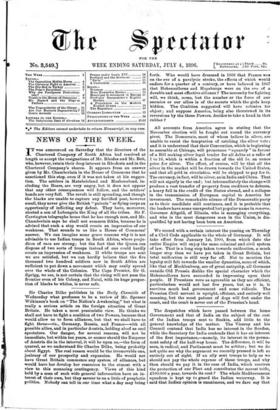Sir Charles Dilke publishes in the Daily Chronicle of Wednesday
what professes to be a review of Mr. Spenser Wilkinson's book on "The Nation's Awakening," but what is really a serious article on the foreign situation of Great Britain. He takes a most pessimistic view. He thinks we shall not have to fight a coalition of two Powers, because that would allow us to form alliances, but that we shall have to fight three—viz., Germany, Russia, and France—with all possible allies, and in particular Austria, holding aloof as cool spectators. Our danger, for several reasons, will not be immediate, but within ten years, or sooner should the Emperor of Austria die in the interval, it will be upon us,—the form of quarrel, as we understand Sir Charles Dilke, being probably about Egypt. The real reason would be the irremovable one, jealousy of our prosperity and expansion. He would not have Great Britain commence any system of alliances, but would have her develop her resources to the utmost with a view to this menacing contingency. Views of this kind held by a man of such wide general information have an in- terest of their own, but they savour to ns a little of prophetic politics. Nobody can tell in our time what a day may bring
forth. Who would have dreamed in 1868 that France was on the eve of a paralytic stroke, the effects of which would endure for a quarter of a century, or have believed in 1867 that Hohenzollerns and Hapsburgs were on the eve of a durable and most effective alliance P The necessity for fighting will, we think, come, but the number or the force of our enemies or our allies is of the secrets which the gods keep hidden. The Coalition suggested will have colonies for object; and suppose America, being also threatened in its reversions by the three Powers, decides to take a hand in that rubber P










































 Previous page
Previous page